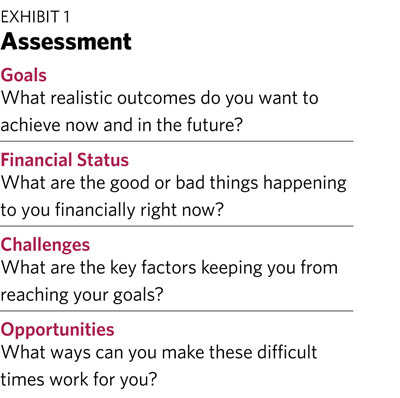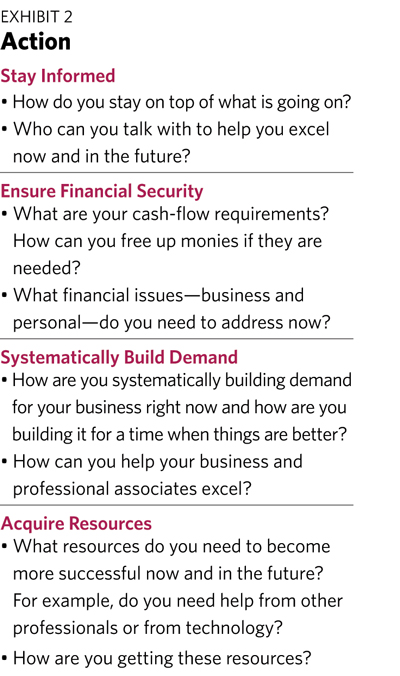One of the best ways for financial advisors (or for lawyers or for any other professional) to connect with wealthy clients and prospects is to host a workshop, whether it’s a session conducted online or in person. A workshop allows advisors a chance to both develop their own new business and educate clients at the same time.
Unfortunately, many of these events and their subject matter are less interesting to the clients than they are to the professionals hosting them.
 As the Covid-19 crisis erupted in March 2020, we developed a workshop focusing on the needs and wants of the wealthy. As we refined the event, called “Thriving in Difficult Times,” we focused increasingly on how clients could deal with the crisis and the subsequent economic fallout. It was an effective way to help those clients make better decisions throughout 2020. Even as we emerge from the crisis, the workshop is helping wealthy clients think through their current situations.
As the Covid-19 crisis erupted in March 2020, we developed a workshop focusing on the needs and wants of the wealthy. As we refined the event, called “Thriving in Difficult Times,” we focused increasingly on how clients could deal with the crisis and the subsequent economic fallout. It was an effective way to help those clients make better decisions throughout 2020. Even as we emerge from the crisis, the workshop is helping wealthy clients think through their current situations.
The Audience
You get the most out of workshops by limiting the size of your audience. In our experience, it’s best to have 10 or fewer participants. Your aim should be to make the workshop highly interactive—remember that the session is all about them. You’re not lecturing your audience, nor are you talking technical matters. Instead, you are helping them gain clarity about their current situation and sort out what they can do to be more successful.
While we primarily started our workshop for ultra-wealthy entrepreneurs and the super-rich, workshops can involve other types of professionals and participants. For example, you could host your own session on behalf of another professional—someone who might be a good source of wealthy client referrals.
Thriving in Difficult Times
We call it a workshop, but it’s much more like a small group meeting where our role is to facilitate. To some extent, the participants will share information and ideas, but usually the biggest value for the participants is that they are thinking through the issues they face more thoughtfully and cohesively. We also help them think through possible courses of action that can help them excel.
We begin with introductions, asking each person how they’re doing and getting them to briefly describe their business or career. Then we have them take two sheets of paper, fold then in half, and fold them in half again. That’s two sheets of paper each folded into four quadrants.
On one sheet we have them perform an assessment. The quadrants are titled “goals,” “financial status,” “challenges” and “opportunities.” We ask participants questions and have them fill in their responses in each box.
As they write their answers, we ask them to discuss their responses. That often leads to dead silence. Many people simply aren’t comfortable discussing their situations with strangers. But when they do, the sharing they do with peers can lead to valuable insights. And at the very least it gets them thinking about the issues and getting their thoughts down on paper.
We can now move on to the second page—the action page—and it, too, is divided into four quadrants.
 This is where the participants address the critical steps they can take to thrive—there’s a step for each of the four quadrants, and just as we did with the assessment page, we ask the participants questions to facilitate discussion.
This is where the participants address the critical steps they can take to thrive—there’s a step for each of the four quadrants, and just as we did with the assessment page, we ask the participants questions to facilitate discussion.
When we say “stay informed,” that also means understanding whom a client wants advice from. If you run the workshop well, you are probably already part of the client’s quadrant, because you’re helping them think about what they need. They are also likely going to think of the services you offer when they move to the other action items—ensuring their financial security and acquiring resources—and thus they’ll also want to think about compensating you for your services.
You can glean insights from both the assessment and action pages and use these perspectives to help the clients achieve their goals.
Follow Up
Again, you can run workshops for anybody: for ultra-wealthy entrepreneur clients, for the wealthy clients of people who refer you or for a high-end mastermind group. Whoever it is, you’re going to want to make sure and follow up with everybody who comes. There are a number of reasons for this.
First and foremost, you want to make sure you’re delivering value with the workshop—that you are indeed helping clients through both good and difficult times. By contacting them afterward, you can ascertain their reaction and likely find ways to refine your approach to the sessions and get better at hosting them.
You’ll also want to follow up because participants will want to discuss the answers they gave on the assessment and action sheets. They’ll want to know what you think about their answers and what other people like them are doing. Your ability to provide these insights and perspectives is very useful to them and will give you more chances to apply your expertise. The result is often that you’ll help the clients—and then you’ll help yourself by generating more business.
Russ Alan Prince is president of R.A. Prince & Associates. Brett Van Bortel is director of consulting services for Invesco Consulting.